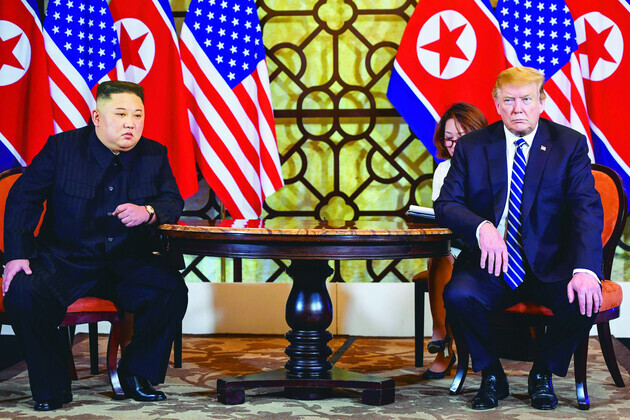hankyoreh
Links to other country sites 다른 나라 사이트 링크
Kim-Trump summit in Hanoi could have eliminated 80% of N. Korea’s nuclear capacity, a report says

If the second North Korea-US summit, held in Hanoi at the end of Feb. 2019, had succeeded and North Korea had dismantled its Yongbyon nuclear plant, a symbol of the North’s nuclear program, it would have eliminated 80% of the North’s capacity for producing nuclear weapons, a new report finds.
That’s the conclusion of “DPRK Strategic Capabilities and Security on the Korean Peninsula: Looking Ahead,” a report published on Wednesday by the UK’s International Institute for Strategic Studies (IISS) and Russia’s Center for Energy and Security Studies (CENESS).
After assessing North Korea’s capacity for producing plutonium and highly enriched uranium, which are necessary for the manufacture of nuclear weapons, the researchers said, “We therefore assess that dismantling all Yongbyon facilities, as discussed at the Hanoi summit in February 2019, would significantly reduce Pyongyang’s capability to make weapons-usable fissile materials. If only one other enrichment plant is operational, then eliminating the Yongbyon facilities would reduce North Korea’s weapons-production capacity by up to 80%.”
In an online forum held to mark the report’s release, IISS researcher Mark Fitzpatrick said that dismantling the Yongbyon facility would prevent North Korea from producing plutonium and tritium, which is one of the materials used to make hydrogen bombs.
North Korean leader Kim Jong-un told then-US President Donald Trump during their summit in Hanoi in February 2019 that he was willing to dismantle the Yongbyon nuclear facility in exchange for the US lifting five sanctions that impact the civilian economy among the various resolutions passed by the UN Security Council since 2016.
But the US didn’t accept that offer, insisting that North Korea needed to shut down other nuclear facilities along with Yongbyon. Pyongyang expressed its disappointment, remarking that the US might never again have such a good opportunity and hasn’t engaged in meaningful nuclear negotiations in the two and a half years since then.
CENESS Director Anton Khlopkov said that North Korea’s current moratorium on the testing of nuclear weapons and intercontinental ballistic missile tests has limited its development of nuclear warhead and missile capacity and urged the US to be more proactive about North Korean nuclear diplomacy.
More specifically, the report estimates that North Korea possessed enough fissile material as of September 2020 to produce between 13 and 47 nuclear warheads and that it can produce up to 6 kilograms (13 pounds) of plutonium and 100 kilograms (220 pounds) of highly enriched uranium each year, or enough to make about five nuclear weapons.
The report estimates that North Korea possesses 18-30 kilograms (40-66 pounds) of plutonium (enough to make 4-7 nuclear weapons, assuming that each takes 4kg of plutonium) and 180-810 kilograms (400-1785 pounds) of highly enriched uranium (enough to make 9-40 nuclear weapons, assuming that each takes 20 kilograms of uranium).
By Gil Yun-hyung, staff reporter
Please direct comments or questions to [english@hani.co.kr]

Editorial・opinion
![[Column] Season 2 of special prosecutor probe may be coming to Korea soon [Column] Season 2 of special prosecutor probe may be coming to Korea soon](https://flexible.img.hani.co.kr/flexible/normal/500/300/imgdb/original/2024/0426/3317141030699447.jpg) [Column] Season 2 of special prosecutor probe may be coming to Korea soon
[Column] Season 2 of special prosecutor probe may be coming to Korea soon![[Column] Park Geun-hye déjà vu in Yoon Suk-yeol [Column] Park Geun-hye déjà vu in Yoon Suk-yeol](https://flexible.img.hani.co.kr/flexible/normal/500/300/imgdb/original/2024/0424/651713945113788.jpg) [Column] Park Geun-hye déjà vu in Yoon Suk-yeol
[Column] Park Geun-hye déjà vu in Yoon Suk-yeol- [Editorial] New weight of N. Korea’s nuclear threats makes dialogue all the more urgent
- [Guest essay] The real reason Korea’s new right wants to dub Rhee a founding father
- [Column] ‘Choson’: Is it time we start referring to N. Korea in its own terms?
- [Editorial] Japan’s rewriting of history with Korea has gone too far
- [Column] The president’s questionable capacity for dialogue
- [Column] Are chaebol firms just pizza pies for families to divvy up as they please?
- [Column] Has Korea, too, crossed the Rubicon on China?
- [Correspondent’s column] In Japan’s alliance with US, echoes of its past alliances with UK
Most viewed articles
- 1No good, very bad game for Korea puts it out of Olympics for first time since 1988
- 2[Column] Season 2 of special prosecutor probe may be coming to Korea soon
- 3Korea’s 1.3% growth in Q1 signals ‘textbook’ return to growth, says government
- 4‘We must say no’: Seoul defense chief on Korean, USFK involvement in hypothetical Taiwan crisis
- 5Is N. Korea threatening to test nukes in response to possible new US-led sanctions body?
- 6Division commander ordered troops to enter raging flood waters before Marine died, survivor says
- 7[Column] ‘Choson’: Is it time we start referring to N. Korea in its own terms?
- 8Will NewJeans end up collateral damage in internal feud at K-pop juggernaut Hybe?
- 9Korea sees more deaths than births for 52nd consecutive month in February
- 10[Editorial] Korea’s surprise Q1 growth requires objective assessment, not blind fanfare